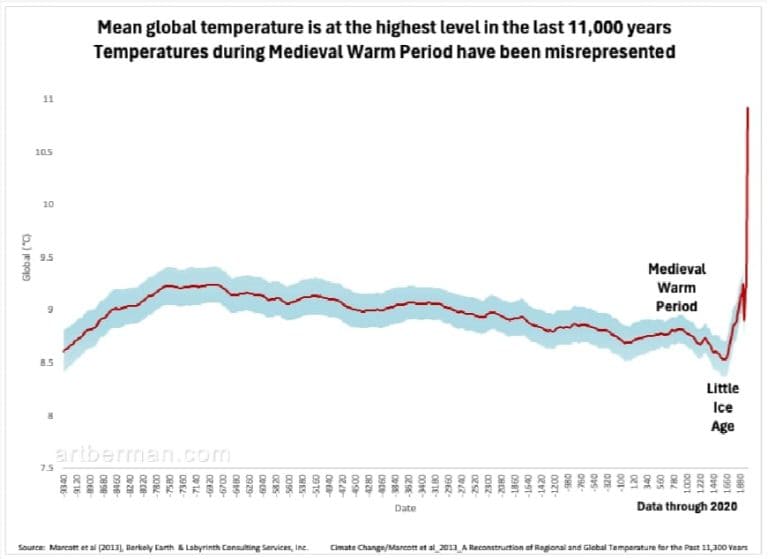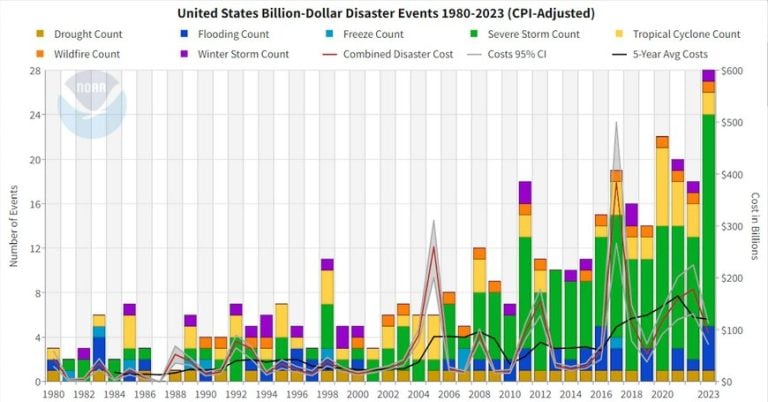How will climate change and destruction of the natural world affect the future? No one knows for sure but most-likely outcomes don’t look very good unless we do something radically different from what’s being done now.
Scientists can be pretty bad at communicating to the public about the state of the planet. In retrospect, our focus on carbon dioxide (CO2) was a messaging disaster. It confused the public and opened the door for deniers to change the subject from global heating to whether or not CO2 was its cause.
It was also a mistake to use terms like “global warming” and “climate change.” These bland expressions suggested that the future was manageable if we just made a few small adjustments.
The emphasis all along should have been on temperature, the heating of the planet.
The planet is getting too hot for humans and most other species to flourish. Mean global temperature is at the highest level in at least the last 11,000 years (Figure 1).

The data in Figure 1 is from one of the most thorough and comprehensively integrated studies in all of climate science.
A more recent paper showed that present global temperatures are the highest in at least the last 24,000 years.
“We show that the magnitude and rate warming over the last 100 years far surpasses the magnitude and rate of changes over the last 24,000 years.”
Matt Osman
This is science. Others look to irrelevant arguments or excuses so they don’t have to think about those unpleasant outcomes.
What about the Medieval Warm Period? It was real but temperatures were lower than levels over the last 150 years. The idea that temperatures were hotter than today in the Middle Ages is based on bad science that has been discredited as academically dishonest misinformation.
People continue to make ridiculous arguments that a hotter planet is actually a good thing—that agriculture in cold areas will be possible or that the negative effects of climate change are minimal.
Alex Epstein has proclaimed that global heating is “mild and manageable” and that its threats are greatly exaggerated. Data, however, indicates that he is wrong.
“Climate change is generating increasing and more certain risks and impacts…Demonstrating just how evident these impacts already are, the U.S. suffered billion-dollar climate catastrophes 28 times in 2023, the highest number of disasters ever in a calendar year, as shown in Figure 2 below.”
GARI (Global Adaptation & Resilience Investment Working Group)
Greed Partners with Complacency to Produce Disaster

A stable climate is requisite for successful agriculture. The fact that some colder areas will become warmer and theoretically prone to higher crop yields than at present becomes irrelevant if weather is too unstable to support commercial farming.
David Barker wrote in The Wall Street Journal this week that alarm about climate change is based on “bad science.”
“Economic growth, compounding year after year, can far outstrip the effects of climate. But to inflict their agenda, climate alarmists need to show that warming will reduce economic growth.”
David Barker
I’d encourage him to take figures 1 and 2 from this post to any Las Vegas book maker and ask what odds he’d pay that Barker is right.
Society is in a terrible predicament. Not only is the planet getting too hot for human civilization to flourish but over-consumption of all energy is destroying earth’s ecosystem—the true basis of wealth that forms the foundation for human prosperity.
Well-intentioned people look for solutions. Populist con-artists profit by telling people there is nothing to worry about, and that climate change is either a hoax or will actually make things better for the planet.
I’d like to tell people that renewable energy is part of a solution but I fear that substituting renewable for fossil energy will make that problem even worse. It will enable continued growth of the human enterprise which is unfortunately the primary source of our predicament. Climate change is but one of growth’s many serious consequences.
If some brand me as an alarmist for pointing out the obvious, maybe that tells us all we need to know about those people—they can’t handle the truth.
Figure 1 alarms the hell out of me and should alarm any sane and reasonable person. The planet is 20% hotter than the average temperature since before agriculture began, and I see no relief in sight unless something very different happens going forward.
We are well beyond a soft landing for the planet. There are no moderate pathways ahead. The only move we have left is radical acceptance of our situation, of the human predicament.
“What is Radical Acceptance? It’s when you stop fighting reality, stop throwing tantrums because reality is not the way you want it…Rejecting reality does not change reality…Acceptance may lead to sadness, but deep calmness usually follows. The path out of hell is through misery. By refusing to accept the misery that is part of climbing out of hell, you fall back into hell.”
Marsha Linehan on Radical Acceptance
Solutions are impossible until we understand and accept what we’re up against. Let’s start there. Right now.

Art Berman
Art Berman is anything but your run-of-the-mill energy consultant. With a résumé boasting over 40 years as a petroleum geologist, he’s here to annihilate your preconceived notions and rearm you with unfiltered, data-backed takes on energy and its colossal role in the world’s economic pulse. Learn more about Art here.

